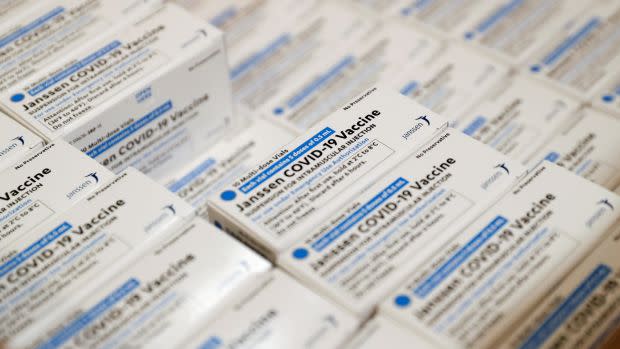Flying, pregnancy, or taking the pill all carry much higher blood clot risks than the J&J vaccine

The US Centers for Disease Control and Prevention (CDC) and the Food and Drug Administration have called for the US to suspend the administration of the Covid-19 vaccine made by Johnson & Johnson over concerns about blood clots. Federal sites, as well as local ones in states including New York, Massachusetts, Georgia, and Nebraska, and the drug-store chain CVS, will pause giving J&J shots.
Blood clots occurred in six women who received the vaccine, which is administered in a single dose. So far, 7 million patients have received the vaccine, and 9 million more doses are ready to be distributed.
The CDC believes it will be only a matter of days before the concern is investigated, and framed the measure as an abundance of caution. It isn’t yet clear whether it was the vaccine that caused the blood clots, which would still be an extremely rare occurrence. The CDC says pausing the administration gives time to understand whether there is a link with the vaccine, and prepare the health system to treat any blood clots, however rare, that might occur post-vaccine.
Temporary suspension of a drug approved for emergency use is standard practice even in the case of rare side effects, yet the news doesn’t exactly boost vaccine confidence in a climate where as many as a third of Americans foster at least some skepticism.
Something similar happened with the AstraZeneca vaccine, which in March was temporarily suspended, and later reintroduced, in several European countries following the rare emergence of blood clots after the injection.
What increases the risk of blood clots?
The effective risk of blood clots associated with the J&J vaccine is extremely low. Even if all the cases emerged so far were confirmed, that would be only 0.00009% of people who receive the shot—or 9 in 10 million.
That’s fewer than the percentage of people who develop blood clots in America otherwise. According to the CDC, 300,000 to 600,000 people will develop blood clots every year, so more than 1 in 1,000. Blood clots can be fatal. About a quarter of those who develop them die suddenly, and another 10% to 30% of those who are diagnosed with blood clots die within the month.
When it comes to blood clots, too, there are many common drugs and activities that put us at a higher risk of it than the vaccine.
The contraceptive pill, taken by an estimated 80 million women in the US, carries a 0.1% risk of causing blood clots, or one in 1,000.
Over-the-counter non-steroid anti-inflammatory drugs (NSAID) such as Ibuprofen have also been associated with increased risk of blood clots—a 2012 study found that they might double the risk, and the EU has issued a warning about the blood coagulation risk with such medications.
Hormone replacement therapy, too, increases blood clot risk. This is especially true when the replacement hormone is estrogen, which puts a woman at double to four times the risk of getting blood clots, but can happen with testosterone, too.
Air travel, and especially long-haul flights of four or more hours, put us at a high risk of embolism. According to the CDC, the risk of developing blood clots after such a flight is 3% to 12%, depending on whether the person had other underlying conditions. Other forms of travel can increase the risk of blood clots if it involves sitting in a confined space for long stretches of time, although the incidence isn’t as high as in air travel.
Pregnancy increases the risk of blood clots in women fivefold—and the risk continues after birth, too.
Dehydration is also an often-overlooked cause of blood clots, and while it’s hard to quantify its impact, doctors say not enough water (and, too much caffeine) can lead to a higher occurrence of blood clots, especially in hot climates.
Smoking increases the risk of blood clots significantly—in a 2019 study, researchers found smokers were more than 32% more likely to be hospitalized for blood clots than non-smokers.
Covid-19 causes blood clots in about 20% of its severe cases—nearly 100% of which are avoided thanks to the J&J vaccine.
Sign up for the Quartz Daily Brief, our free daily newsletter with the world’s most important and interesting news.
More stories from Quartz:
